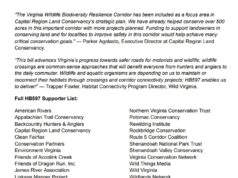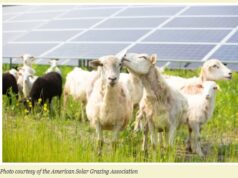From the Natural Resources Defense Council (NRDC):
Report: Virginia Drinking Water Threatened by Atlantic Coast and Mountain Valley Pipelines
With new analysis on groundwater threats and earlier report of dangers to rivers and streams, Water Board and Northam administration should act to protect Virginians
RICHMOND, VA (May 29, 2018) – Two proposed large gas pipelines could pollute valuable groundwater that supplies drinking water across Virginia, according to a report released today by the environmental consulting firm Downstream Strategies, which was prepared for the Natural Resources Defense Council.
This report concludes that the pollution threat from the Atlantic Coast and Mountain Valley pipelines presents a health risk, prompting NRDC to call for further study of water threats by state agencies and the Northam administration while halting the projects.
“Here’s a flashing warning sign: This report confirms that Virginia drinking water is in serious danger from the Atlantic Coast and Mountain Valley pipelines,” said Walton Shepherd, an energy and climate expert at NRDC. “Vast areas of groundwater, as well as hundreds of miles of rivers and streams, are threatened with contamination.”
The groundwater report follows an earlier Downstream Strategies report documenting the pipelines’ threats to drinking water drawn from rivers and streams. It also comes just after landowners near Roanoke were alarmed by streams and ponds turning muddy from rainfall runoff along the route of the Mountain Valley pipeline, on which pre-construction work has begun. WDBJ story here.
The new groundwater report illustrates why general permits issued by federal agencies, such as the Army Corps of Engineers, are insufficient. Given that the Virginia Water Board and Department of Environmental Quality are required by law to protect groundwater as well as surface waters from contamination, this new report provides multiple reasons for the Water Board to require individual permits for water crossings. Individual permits are the best way to fully know the threats to water along the proposed pipeline routes.
“It’s time for the Northam administration to step up and work with the Water Board to perform the needed thorough assessment of the pipelines’ threats to Virginia water,” said Shepherd. “And if protection of drinking water can’t be assured, the Water Board needs to stop these risky and unnecessary projects, once and for all.”
The report shows that pipeline construction can harm groundwater in various ways, including:
- Construction methods. Surface spills of petrochemicals from construction or drilling can leach down into groundwater. Blasting, trenching, sinkhole filling, drilling and soil management present significant risks to underground sources of drinking water.
- Changing topography The pipelines pose a risk to groundwater across 100 miles of Virginia with karst topography, noted by underground caves, porous rock and aquifers that provide direct access for pollutants to quickly reach water tables, wells and springs. The pipelines are also a danger to non-karst areas of more solid underground rock. To help ensure protection of groundwater, the report calls for much more testing of private water wells along the routes.
- Design. Current designs for the pipelines’ construction are at risk of replicating drinking water contamination in incidents that occurred during construction of pipelines in other states.
Even the operators’ plans to do baseline testing for both water quantity and quality for the Atlantic Coast and Mountain Valley pipelines are inadequate to protect drinking water sources, the Downstream Strategies report shows.
The threats worry landowners in their path.
“I expected Governor Northam would use science and the law to protect my drinking water from construction of the Mountain Valley Pipeline, but so far, that hasn’t happened,” said Jacki Lucki who lives in Roanoke County, along the route of the MVP. “I live amid a mountain sanctuary that has been lovingly protected for generations and is now threatened by this pipeline project. The governor and state agencies should put a halt to it, so we can continue to enjoy safe drinking water.”
William Limpert, who lives within several hundred feet of the path of the Atlantic Coast project, said: “The Atlantic Coast Pipeline would threaten my drinking water well, and many others, in a sensitive karst area where water can be very difficult to keep free of contamination. Without clean drinking water, my property and others could become worthless. I urge Governor Northam to follow through on his pledges to science and the law, take a hard look at this newest science on the risks to drinking water, and then take whatever steps necessary to protect us from this project.”
Resources:
The Downstream Strategies report on groundwater threats from the pipelines is here: https://assets.nrdc.org/sites/default/files/downstream-strategies-threats-to-groundwater-from-the-mountain-valley-pipeline-atlantic-coast-pipeline-in-virginia_2018-05-25.pdf?_ga=2.217297045.2075549452.1527599633-1860928930.1527170967
The Downstream Strategies report on surface water threats from the pipelines is here: https://www.nrdc.org/resources/nrdc-report-threats-water-quality-mountain-valley-pipeline-and-atlantic-coast-pipeline
A blog by Mall on the groundwater threats is here: https://www.nrdc.org/experts/amy-mall/virginia-groundwater-needs-protection-pipelines
This recent news story from WDBJ in Roanoke shows why Virginians are concerned and why state action is needed: http://www.wdbj7.com/video/?vid=483644831&vid=483644831
# # #
The Natural Resources Defense Council (NRDC) is an international nonprofit environmental organization with more than 3 million members and online activists. Since 1970, our lawyers, scientists, and other environmental specialists have worked to protect the world’s natural resources, public health, and the environment. NRDC has offices in New York City, Washington, D.C., Los Angeles, San Francisco, Chicago, Bozeman, MT, and Beijing. Visit us at www.nrdc.org and follow us on Twitter @NRDC.


![Video: Ivy Main Says “the hostility to offshore wind is really just [Trump]; nobody else feels this way…he will be gone and then we will get back on track”](https://bluevirginia.us/wp-content/uploads/2026/02/axiosivymain-238x178.jpg)









![Saturday News: “Ukraine is the biggest and most consequential of all the American betrayals”; “Get Ready for Zombie Tariffs”; Murdoch’s WSJ – “Trump Demeans Himself as He Attacks the Supreme Court”; “Virginia House Delays Action on Bill Banning [Lethal Pesticide] Paraquat”](https://bluevirginia.us/wp-content/uploads/2026/02/montage0221-100x75.jpg)